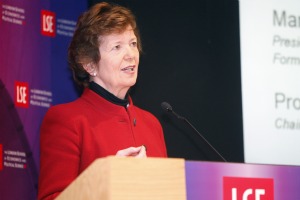‘Biggest human rights issue of the 21st Century’ requires legal solution
Mary Robinson, former UN High Commissioner for Human Rights spoke at the London School of Economics (10 March) about the importance of a new legally binding agreement to follow the Kyoto Protocol. It is only with this, she says, that developing countries will be safe from the impacts of climate change.

 A new legally binding climate pact is needed to replace the Kyoto Protocol to deal with ‘one of the biggest human rights issues of the 21st Century’, according to Mary Robinson, former UN High Commissioner for Human Rights and founder of the Mary Robinson Foundation for Climate Justice.
A new legally binding climate pact is needed to replace the Kyoto Protocol to deal with ‘one of the biggest human rights issues of the 21st Century’, according to Mary Robinson, former UN High Commissioner for Human Rights and founder of the Mary Robinson Foundation for Climate Justice.
The Kyoto Protocol expires at the end of 2012 – time is running out for a new legally binding agreement to replace it. A political pledge between nations looks like the best bet to fill the gap before a new agreement; but how will the plight of developing countries be worked into these pledges?
Mary Robinson, former President of Ireland and former UN High Commissioner for Human Rights, believes climate change to be one of the top human rights issues in the world today and wants to see a new legal agreement take this into account.
She believes an imbalance exists between the causers of climate change – the long-standing, big polluters, developed countries including the U.S. and the EU – and those feeling the effects of climate change, mostly in developing countries that do not have the funds or resources to adapt to the environmental changes occurring.
As more countries fight for harder targets in emissions reductions, these developing countries, the annex 1 countries, do not have access to what Mary Robinson believes is a fundamental human right, energy. As carbon intensive energy becomes less of an option, she feels it is important that developing countries are not squeezed out of the low carbon market.
Mary said: “What I’m talking about is access to affordable, low carbon energy, where we decouple growth and energy, so you can have low carbon growth, and resource smart growth. What is happening at the moment is, most of the work on renewables is happening in the developed world – and in China and India – but its not happening where there is a desperate need.
“At least 1.4 billion people have no access to electricity in our world today. Most of them living where the sun shines most, where its perfectly doable now that they would have access to off-grid and all kinds of small scale hydro and solar energy.”
At the Cancun Conference of Parties last December, political pledges were made providing aid for developing countries . A new climate green fund was agreed to transfer money from the developed to the developing world for adapting to the impacts of climate change.
Ministers also repeated their political promise made at Copenhagen to raise $100bn (£63bn) in climate aid by 2020, starting with $30bn (£19bn) by 2012. This is however, only a pledge and is not part of the UN process.
However, Mary Robinson said: ”The people who bear the brunt of the effects of climate change and did least to cause the problem, and yet are suffering already…Above all securing a new legally binding climate change agreement would be an important step in protecting their lives and their livelihoods.”
She believes not only could the agreement limit emissions from big emitters and so prevent dangerous climate change, but also that a structure for financial aid to help these countries adapt could be put in place.
A new treaty, whether a continuation of the UNFCCC, building upon the Kyoto Agreement, or whether initiating new long-term cooperative action (LCA), will be needed to secure real action on climate change.
In the meantime, as the timescale to have a new legal treaty agreed and ratified by the time Kyoto runs out, there needs to be real political will, building on that seen in Cancun last year, to keep the momentum going.
Robinson said: “I am willing to go step by step and layer by layer if that is what is needed to get a legally binding agreement.”
However, she also accepts that time will be tight to get a legally binding agreement which will really make a dent in preventing dangerous climate change. She said: “We will need every good idea, every ally, every innovative approach that’s available…2011 is the year to come to grips with the legal form of the agreement and to set down concrete measures to achieving it. Time is running out and there is a lot of work to be done.”
Image: Nigel Stead | LSE



